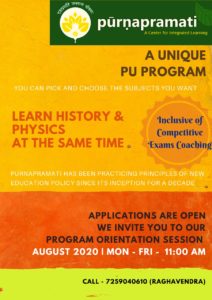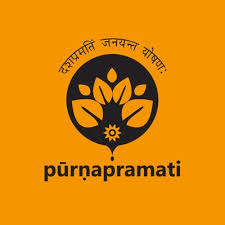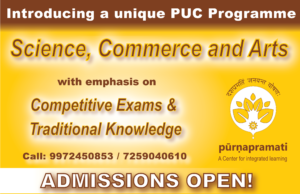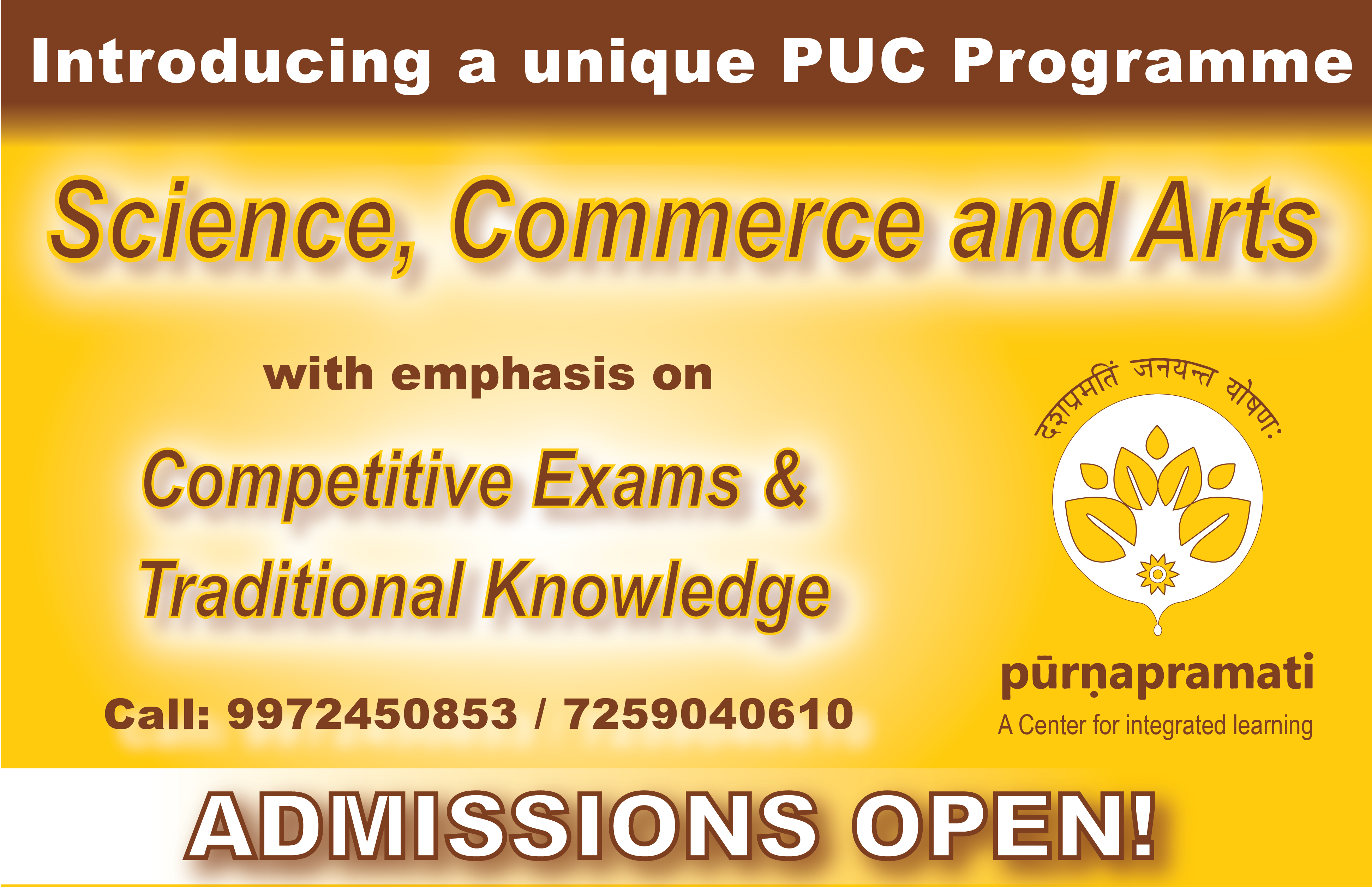Recent Updates
Subscribe
FAQ
Pūrṇapramati ?
Pūrṇapramati is visualized to build a good future society based on holistic education. This education will help the child grow completely through clarity in thought, purity in mind and ability to pursue area of interest with determination. Classical systems like philosophy, arts, music among others will bring a clear purpose to life, while modern systems like science, mathematics, social science, English among others will provide contextual space for pursuing. In essence, Pūrṇapramati will bring happiness to each child, in learning and leading full life.
What Curriculum does Pūrṇapramati follow?
Pūrṇapramati academic council plans to do continuous research and publish a framework to meet our vision. Curriculum will be based on NCF-2005. However, it would also consider other available boards for modern systems, like ICSE, CBSE, NIOS, IGCSE and State Board to recommend what suits us the best. For classical systems too, it will consider relevant boards, vidyapitas and scholarly opinions to ensure that our objective and constraints are met. In essence, it will be a dynamic content. At the eligible age (of 15 or above) or when the student gets ready, the school will enroll the student to one of the open schooling system, either NIOS or ICSE or IGCSE or KSEEB, as preferred by the parents. The school will help the students to prepare for these exams with greater focus in the last 2 years. The students will also be encouraged to enroll certification programs for classical systems like Sanskrit, Fine Arts and Music provided by appropriate boards.
What is system of evaluation in Pūrṇapramati ?
The evaluation is mainly based on a continuous monitoring for individual growth. Elementary school will not have one time annual examinations. However, the students of middle and high school will be gradually trained to write annual competitive examinations to face the board exams.
How does Pūrṇapramati guarantee quality education comparable to modern schools?
Pūrṇapramati ensures quality education by attracting highly talented and committed teachers. The quality is further enhanced by individual attention to each student through very high teacher:student ratio of the order of 1:15.
How will Pūrṇapramati sustain its motive and pursue its mission?
- Pūrṇapramati is an initiative of SatyatÄ«rtha Foundation having multiple areas of interest in social life with a motto – “Truth-seeking, Capable and Caring People Striving for Social Good”. The motto and principles laid out is bringing the right people who can convert the dream into reality.
- The organisation is structured like a professional body to sustain its values, vision and mission beyond an individual or a group. It ensures excellent opportunities for each stakeholder to participate to his true potential and thus fulfill his noble aspirations. Pūrṇapramati has a vision capturing every mind. Its mission and objectives match social needs and aspirations. It is well guided by professional organisational structure. The structure has teachers and parents as the primary stakeholders. Teachers and parent councils are enabled through academic and executive councils in academics, operations, infrastructure and other multidimensional activities.
- The council board of directors consists of executives, visionaries, advisories, partners, patrons of eminence to ensure persistence in executing to its vision, mission and objectives. Pūrṇapramati team has over 40 committed people in various councils today and expected to reach an optimal level in due course. The team consists of
- Qualified, experienced lead teachers with credibility and young passionate Teachers with ability.
- Parents committed to enroll from across the society representing scholarly community and professionals among others.
- Qualified, experienced and young professionals/leaders in management, administration, finance, legal, public relations in Executive Council.
- Expert teachers, writers, thinkers in modern and classical fields for Academic Council.
- Eminent visionaries as key advisers, Esteemed institutes as partners, Knowledgeable entrepreneurs as Patrons, Passionate young achievers as executives in Governing council.
- Committed and able enablers and advisers for each council.
- Prospective huge Friends community to serve needs of community.
- Prospective reserve pool of known people who could be potential members in various councils.
Is Pūrṇapramati a profitable organization?
No. Pūrṇapramati is an initiative of SatyatÄ«rtha Foundation® a non-profit organization consisting of value-centered professional and committed people who are voluntarily working with a shared motto to serve the society for good.
How do you build your infrastructure?
Our team voluntarily contributes for Infrastructure along with community participation in large through various programs of interest to society.
What will students of Pūrṇapramati do after 10th?
After completing their 10th, they can continue to study in Pūrṇapramati Or go to a formal college or Vidyapita.
What will students of Pūrṇapramati do after 12th?
After completing their 12th, they can pursue their under-graduate education in modern systems or in classical systems like Vidyapita.
How will Pūrṇapramati students be different from others after schooling?
Pūrṇapramati students will have a broad perspective of various disciplines in modern and classical fields. The school program also ensures building a strong character based on long lasting values. In addition, they would have been enabled in identifying their very own interest and potential. All these help them to chose a field resonant to their interests and pursue the same on broader values to realize their best potential.
Will learning two parallel systems of education cause burden on students?
No. Pūrṇapramati academic council team has carefully looked into this fundamental question. Unlike a parallel accumulation of two systems, we have tried to integrate the two systems in concept and time. Conceptually, Sanskrit is replacing second language and perfectly fits in the current scheme of things. Sanskrit grammar is an extension of language and would even complement to improving ones etymological, mathematical and analytical ability. Philosophical courses are fundamental to life and can be very well related to all subjects. Epistemological content of Philosophy must not only improve logical thinking, but can also be connected to science and mathematics. Ontological content can be bridged to social sciences and humanities. Besides, our team has proposed a smart and well balanced time distribution to add new integrated content as a part of regular school schedule. This has enabled coverage of our new concept without additional burden on the student.
How can I be a part of this school?
You can become a parent or a teacher, the primary stakeholders of this school.
If you are in expert in modern or classical systems, you can contribute in our academic council.
If you have enough time and resources, you can contribute in our executive council.
If you are a visionary, program executive, educationalist or social entrepreneur, you can contribute in our governing council.*
How can I contribute to this school?
You can join our friends community by offering contributions to various programs like child sponsorship, social capital, infrastructure sponsorship, event sponsorship etc. Please register to our friends community group to get regular updates – FriendsOfOurSchool@googlegroups.com
*The participation in all councils is subject to need and requirement match














